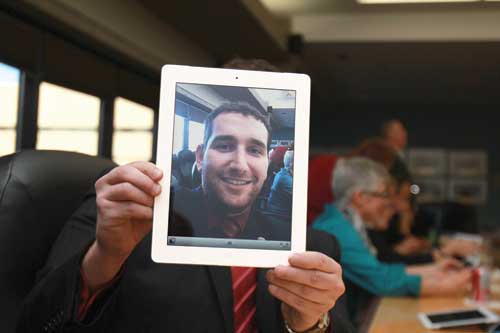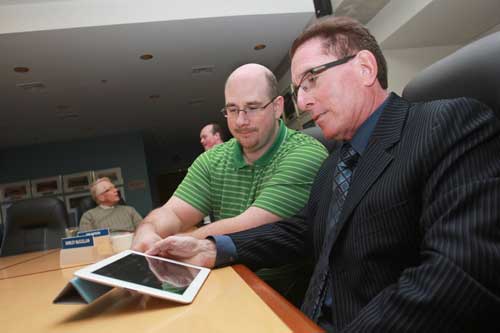Imagine a tower of completely full binders more than 34 feet tall, or a large stack of photocopy paper packages greater than 19 feet tall.
That's a lot of paper (from a lot of trees), and the approximate amount of printed material required in a typical year to support the University of Lethbridge Board of Governors in their decision-making processes.
In mid-November, however, the Board literally stopped the presses on printing hard copies of their materials (other than a set or two for document retention and archival purposes), and has migrated to an iPad-based paperless system.

"We are incorporating sustainability and a more efficient use of resources into our operating model, just as other areas of campus are doing," says Jodie Black, the Board secretariat and person responsible for managing the Board's information flow.
"We conducted a complete analysis of our past practices, future needs, efficiency and cost effectiveness. The decision to go paperless was an obvious and sensible choice."
Black says that in addition to cost savings, the flexibility and quick process of information sharing with the new iPADs is becoming very handy.
"There is less paper to manage, we have less paper to worry about shipping, and I can easily get information in front of people very quickly," she says. "As an example, we were able to deliver a 40-page, last-minute agenda item immediately to our Board shared drive, versus printing off copies for everyone."
Board information packages are now available on a shared drive rather than printed, mailed and/or couriered. Over time, the previous folders and binders full of information used by most Board members would get cumbersome, while the iPad continues to take up the same amount of space, regardless of how much information it stores.
Black says the cost of the transition is being amortized over two years.
"The price of the initial iPad purchases will be recouped due to cost savings in printing and distribution."

The big switch happened last month, and for the Board's first paperless meeting, members of the Information Technology team were on hand to make sure everything ran smoothly.
"Our IT group has been extremely helpful with the process, the transition and for the occasional challenges we've encountered," says Black. "We are also tracking how this works over time, so that other units on campus can take advantage of going paperless if they choose to do so."
Currently, Athabasca University uses a paperless system for their board of governors, and Black says that other institutions are watching the U of L's progress with interest as they research their own options.
"I am also willing to meet with any other business unit or group on campus looking to go paperless," says Black. "We're looking to lead by example, and also to have what the Board does to support sustainability be a part of our regular business practices."
Those interested can contact Black at Jodie.black@uleth.ca to set up a time to talk.
